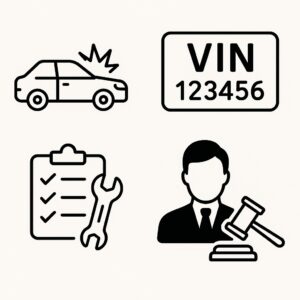Car accidents don’t just end with tow trucks and repair bills. The truth is, a wrecked car can find its way back onto the market surprisingly fast. A little paint, a few replacement parts, and suddenly that same vehicle is sitting on a used lot, looking good as new. To the average buyer, it’s just another car. But underneath? The story can be very different.
What Buyers Don’t See
Here’s the problem. Not every total-loss car stays off the road. Some are patched up cheaply and then shuffled through auctions. Others cross state lines, where paperwork gets “cleaned up.” Title washing, they call it. On paper, the car looks fine. In reality, it might have bent frame rails, airbags that don’t deploy, or water damage from floods.
Imagine this: you buy a sedan for your teenager. It drives fine, nothing obvious. A year later you learn it was in two serious crashes. The frame was weakened. And suddenly you’re wondering if it would even hold up in another accident. That’s not just money lost—it’s a safety risk.
How a VIN Check Helps
This is why lawyers and consumer advocates push VIN checks. A simple report tells the hidden story. You plug in the car’s VIN and see accident records, salvage branding, odometer rollbacks, and sometimes even recalls that were never fixed.
Running a VinScanPro VIN check report won’t change the car’s past, but it gives you the truth before you sign a contract. And that truth can save thousands of dollars—or keep you out of court later.
Why Attorneys Care Too
For attorneys, VIN checks aren’t just about buying cars. They can tip the scales in a claim. If a client is hurt in a vehicle with undisclosed damage, a report can prove the history. That makes negotiations with insurers a lot tougher for the other side. It can also expose negligence if a dealer knowingly sold a dangerous car.
In disputes, paperwork talks. And VIN reports are paperwork you can’t argue away. Lawyers often use them to support expert testimony, to compare timelines of repairs, or to highlight gaps in a seller’s disclosure. Even when a case doesn’t make it to court, the presence of a VIN report often forces faster and fairer settlements.
Practical Advice for Buyers
Not every buyer has an attorney by their side, but the same principles apply. Before you commit to any used car, take a few minutes to run a VIN check. Compare the details in the report with what the seller tells you. If they claim “no accidents,” but the report shows two, you know you’re dealing with a red flag.
Also, don’t ignore small warnings. Even a single odometer discrepancy can suggest larger issues. If something feels off, walk away. There will always be another car, but you only get one chance to avoid a bad purchase.
Don’t Skip the Step
Think about it this way. You wouldn’t buy a house without an inspection. So why gamble on a car that’s been through an accident? Skipping this step is like closing your eyes and hoping for the best. Sometimes you get lucky. Sometimes you don’t.
A VIN check is quick, inexpensive, and one of the easiest ways to protect yourself. It’s peace of mind for buyers. It’s leverage for attorneys. And most importantly, it keeps unsafe vehicles off the road where they could hurt someone else.
